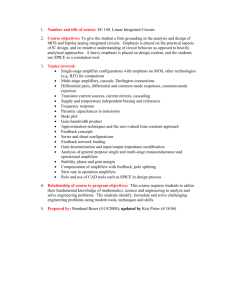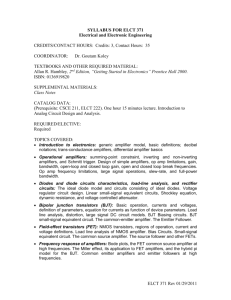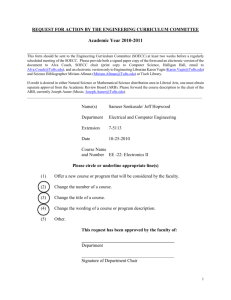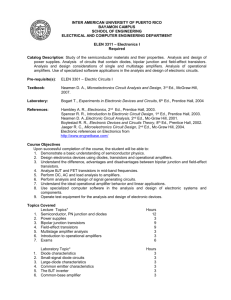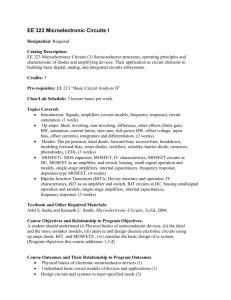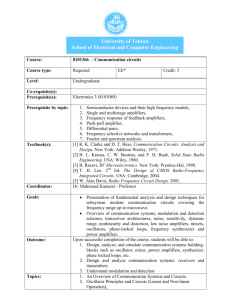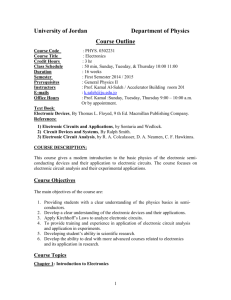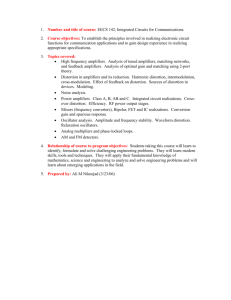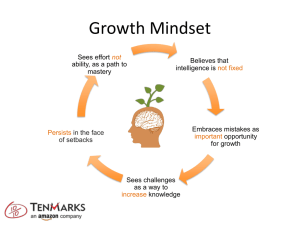EE 618 - Monolithic Microwave Integrated Circuit Design
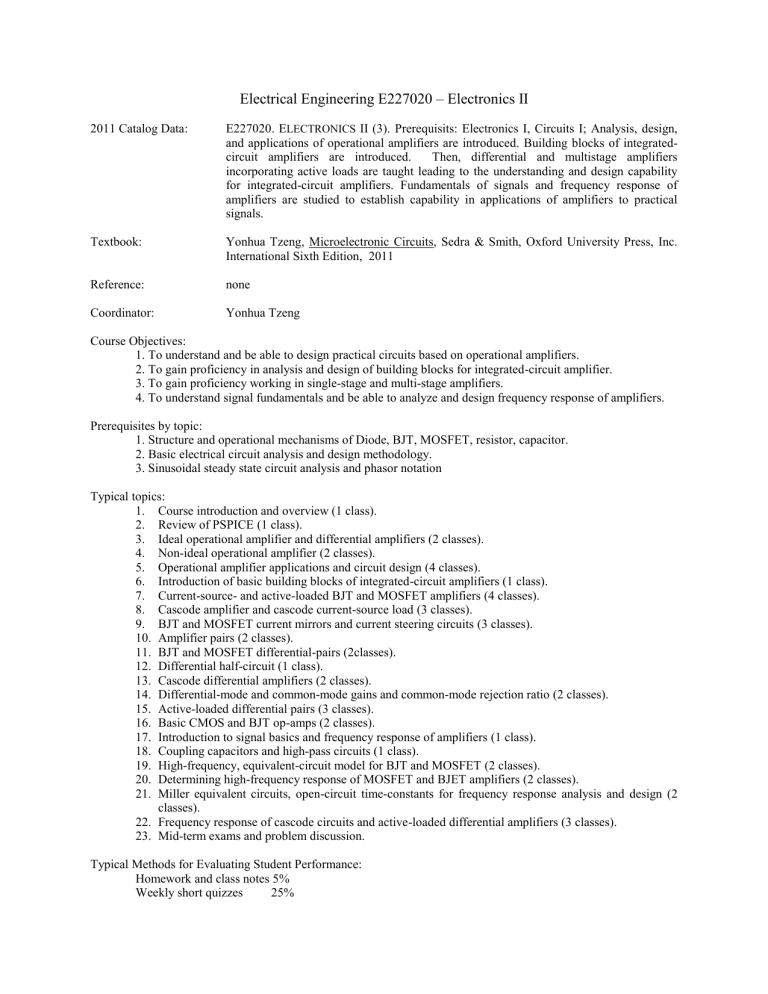
Electrical Engineering E227020 – Electronics II
2011 Catalog Data: E227020.
E LECTRONICS II (3). Prerequisits:
Electronics I, Circuits I; Analysis, design, and applications of operational amplifiers are introduced. Building blocks of integratedcircuit amplifiers are introduced. Then, differential and multistage amplifiers incorporating active loads are taught leading to the understanding and design capability for integrated-circuit amplifiers. Fundamentals of signals and frequency response of amplifiers are studied to establish capability in applications of amplifiers to practical signals.
Textbook: Yonhua Tzeng, Microelectronic Circuits, Sedra & Smith, Oxford University Press, Inc.
International Sixth Edition, 2011
Reference:
Coordinator:
Course Objectives: none
Yonhua Tzeng
1. To understand and be able to design practical circuits based on operational amplifiers.
2. To gain proficiency in analysis and design of building blocks for integrated-circuit amplifier.
3. To gain proficiency working in single-stage and multi-stage amplifiers.
4. To understand signal fundamentals and be able to analyze and design frequency response of amplifiers.
Prerequisites by topic:
1. Structure and operational mechanisms of Diode, BJT, MOSFET, resistor, capacitor.
2. Basic electrical circuit analysis and design methodology.
3. Sinusoidal steady state circuit analysis and phasor notation
Typical topics:
1.
Course introduction and overview (1 class).
2.
Review of PSPICE (1 class).
3.
Ideal operational amplifier and differential amplifiers (2 classes).
4.
Non-ideal operational amplifier (2 classes).
5.
Operational amplifier applications and circuit design (4 classes).
6.
Introduction of basic building blocks of integrated-circuit amplifiers (1 class).
7.
Current-source- and active-loaded BJT and MOSFET amplifiers (4 classes).
8.
Cascode amplifier and cascode current-source load (3 classes).
9.
BJT and MOSFET current mirrors and current steering circuits (3 classes).
10.
Amplifier pairs (2 classes).
11.
BJT and MOSFET differential-pairs (2classes).
12.
Differential half-circuit (1 class).
13.
Cascode differential amplifiers (2 classes).
14.
Differential-mode and common-mode gains and common-mode rejection ratio (2 classes).
15.
Active-loaded differential pairs (3 classes).
16.
Basic CMOS and BJT op-amps (2 classes).
17.
Introduction to signal basics and frequency response of amplifiers (1 class).
18.
Coupling capacitors and high-pass circuits (1 class).
19.
High-frequency, equivalent-circuit model for BJT and MOSFET (2 classes).
20.
Determining high-frequency response of MOSFET and BJET amplifiers (2 classes).
21.
Miller equivalent circuits, open-circuit time-constants for frequency response analysis and design (2 classes).
22.
Frequency response of cascode circuits and active-loaded differential amplifiers (3 classes).
23.
Mid-term exams and problem discussion.
Typical Methods for Evaluating Student Performance:
Homework and class notes 5%
Weekly short quizzes 25%
Test #1
Test #2
15%
15%
Test #3 15%
Final Exam 25%
Policy on unannounced quizzes: see NCKU policy and class handout for additional policies.
Policy on attendance: see NCKU policy and class handout for additional policies.
Computer Usage:
Computer will be routinely required for solution of homework problems.
Laboratory projects (including major items of equipment and instrumentation used): none
Contribution of course to meeting the professional component:
Engineering topics: 3 credits
100% engineering science
Relationship of course to Electrical Engineering students’ core capabilities:
Core capability 1: Ability to apply knowledge of math, science and engineering to solve problems.
Core capability 3: Knowledge, skills, and proficiency in modern tools for executing practical engineering projects.
Core capability 6: Capabilities of identifying, formulating, analyzing and solving engineering problems.
Prepared by: Yonhua Tzeng Date:___7/16/2011 ___
